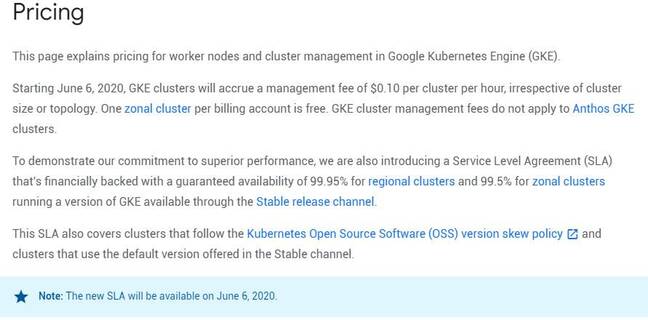This article is more than 1 year old
Google sweetens return of K8s cluster management fees with new SLA, Anthos exclusion ‒ and customers aren't pleased
It's the comeback nobody wanted nor asked for
Updated Google has told customers using its Kubernetes engine (GKE) that a new management fee of $0.10 per cluster per hour (around $73.00 per month) will apply from 6 June 2020.
In November 2017, Google bragged about how it "eliminated the cluster management fee for Google Kubernetes Engine, our managed Kubernetes service". Prior to that date, a cluster management fee of $0.15 per hour applied, but only to clusters of six nodes or more. Each node is a virtual machine, which is billed separately at the normal rate for Google's Compute Engine.
Management fees are now returning for clusters of any size, except that one zonal cluster per billing account is free. A zone in Google Cloud Platform (GCP) is subdivision of a region. The new fee does not apply to Anthos GKE clusters, a more managed product for which Google does not publish pricing ("please contact sales"). GCP is also introducing a Service Level Agreement (SLA) for GKE provided you use a stable release. The SLA guarantees 99.95 per cent availability for regional clusters and 99.5 per cent for zonal clusters.
How much difference does the new fee make? If you have the smallest instance size (1 vCPU, 3.75GB RAM) and just two nodes, without allowing for persistent storage, the monthly fee ($73.00) is more than the instance cost ($62.54). Configure a large regional cluster with high-spec instances, though, and the fee might be 10 per cent or less. One of the issues with this type of fee is that it introduces a financial incentive to prefer larger clusters, whereas these decisions should be guided by architecture.
Coincidentally (or not), AWS also charges "$0.10 per hour for each Amazon EKS cluster that you create", though with no free cluster. Microsoft Azure by contrast states that "there is no charge for cluster management" with its Azure Kubernetes Service.
Customers are not pleased with the news. "I don't think GCP is fully aware of their position in the market as the second, inferior choice," one said over on Hacker News. "I took a bet on the underdog by using GCP and they bit me back in return. Especially considering their 'default' Kubernetes config automatically sets you up with three(!) control planes in replication, that's, as far as I understand, $~300 added to our monthly bill, for nothing."
Another observed: "It's charged per-cluster. GKE encouraged (and was great for) running multiple clusters for all kinds of isolation and security reasons. This cost increases rapidly for those scenarios."
GKE is the heart of GCP's portfolio. Kubernetes originated with Google and the company's expertise in the technology is a key attraction versus its rivals. That said, GCP is a long way behind AWS and Microsoft in market share, and a significant price increase will not help its case.
Another observation is that sudden price increases are an inherent risk of the cloud computing model. The cloud providers can build up trust with customers by consistent pricing, including reductions where technology improvements and scale allow. The reverse is also true. ®
Updated at 15.35 GMT to add
“Beginning June 6, 2020, we’re introducing a GKE cluster management fee of $0.10 per cluster, per hour and a financially-backed SLA with guaranteed availability of 99.95%. This allows our team to remain focused on product innovation, while more closely aligning with industry pricing standards. Customers and developers can continue to experiment with GKE through our free zonal cluster," a Google spokesperson said.

